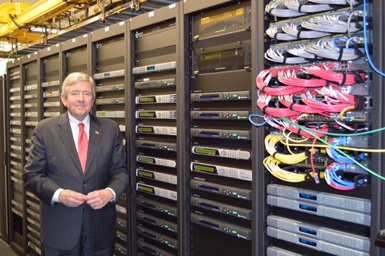Now, through a comprehensive broadband fiberoptic system deployment by the local power company, Opelika Power Service, Opelika is building its own “on-ramp” to the global information highway, thus creating a new local, digital communications asset that puts the city on the high-speed Internet map. It also breaks new ground for the region. With the roll out of fiber-to-the-home services able to reach 100 percent of its citizens, Opelika became the first city in Alabama to have fiber to the user, a smart grid telecommunications deployment that includes video (cable TV), ultra-high speed Internet, and telephone service.
Municipal investment in infrastructure, especially cutting-edge technology like broadband and fiberoptic telecommunications, has proven to be a good investment over time for many larger municipalities, especially when it comes to attracting or retaining large corporate and industrial clients. Rolling Out Fiber Services
But even bigger things are in the works for Opelika's fiber installation. Working in partnership with Opelika Power Service, and technology partners like Lucent/Alcatel; local government, business, and economic development officials have put plans in place to roll out ultra–high-speed fiber services, including phone, data, and video conferencing services to Opelika's business, corporate, and industrial customers. To date, more than 425 miles of fiber connect Opelika customers to the network.
"It's cutting-edge technology and world-class, and some folks might be surprised it's here in a community of only 27,000 people," proudly boasts Opelika Mayor Gary Fuller.
"It's a big investment and a lot of money, and we believe it's going to pay off," the Mayor predicts, noting that Opelika "has already connected between 25 and 30 small businesses to the high-speed service." And, network architects and Opelika Power Service are rapidly building out business-grade services and connections for larger organizations, including customers in the Northeast Opelika Industrial Park and nearby Fox Run Business Park. Both industrial parks are located alongside I-85 and offer greenfield sites as well as available speculative buildings, according to Opelika economic development officials.

Fiberoptic telecommunications technology has several advantages over competing cable and traditional phone company connections based on copper wire. It is more efficient and more secure, and compared to copper cabling, fiberoptic cables can transmit far more information, with a greater degree of fidelity. Fiberoptic cabling also offers extra security for the data being transmitted, since it is much harder to tap than copper cable.
Because fiberoptic cables are glass-based, they don’t conduct electricity. This eliminates the need for grounding, and makes them immune to any type of electrical interference, even lightning. Since fiberoptic cabling is so resistant to interference and atmospheric conditions, it can be used outdoors — and in close proximity to electrical cables — without concern. Fiber also does not pose a threat of physical injury to the user if it breaks. Since fiberoptic cabling transmits light and not electricity, the people handling it run no risk of injury from fire, sparking, or electrocution.
It's cutting-edge technology and world-class, and some folks might be surprised it's here in a community of only 27,000 people Opelika Mayor Gary Fuller An Improved Business Climate
Municipal investment in infrastructure, especially cutting-edge technology like broadband and fiberoptic telecommunications, has proven to be a good investment over time for many larger municipalities, especially when it comes to attracting or retaining large corporate and industrial clients. And, to date, Opelika has a successful record of improving the climate and attractiveness of this small city to new businesses. Just in the past several years, Opelika has made a shift away from its traditional economic basis in textile manufacturing toward more commercial and industrial activity. Last year, Forbes ranked the Auburn-Opelika area as "Number 10 for Best Small Cities for Jobs."
Opelika’s new broadband fiber rollout will be good news to prospective new clients, and is welcome development for several large, global businesses in the area that have been eyeing growth plans for their companies. One such business is Mando America Corporation (MAC), which has its North American headquarters located in Opelika. Mando’s Opelika operations produce brake corner modules, brake calipers, suspension modules, and steering systems to support its customer base located throughout the U.S.
MAC has just embarked on expanding its headquarters and will be spending $35 million for equipment and building improvements over the next three years. The company plans to hire an additional 67 employees to support the expansion. This new investment will bring MAC’s total investment in Opelika to over $190 million and its employment level to near 700.

